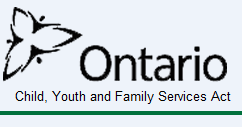6.1 Duty to Report Suspected Child Abuse and Neglect

We all share a responsibility to protect children from harm. This includes situations where children are abused or neglected in their own homes. Ontario’s Child, Youth and Family Services Act provides the legal grounds for that protection for children.
Section 125 Duty to Report:
In pursuit of that purpose, Section 125 of the CYFSA focuses on the duty to report suspicions of harm and the risk of harm to a child. Section 125 (1) outlines suspicions that must be reported and are described within this advisory.
What Does the Children’s Aid Society do?

The Children’s Aid Society (CAS) is a non-profit agency established under section 34 of the CYFSA to provide help and support to children and families. Services that a CAS provides include investigating allegations of abuse, caring for children who come under their supervision, and providing guidance and counselling to families as it relates to child protection and adoption services.
Primary Purpose of the CYFSA:
The primary purpose of the CYFSA is to promote the best interests, protection and well-being of children.
- Promote the best interests of the child
- Protection of children
- Well-being of children
This is important – it does not say that the primary purpose is to apprehend children, a common myth associated with the Children’s Aid Society.
Defining a Child “In Need of Protection”
The Child, Youth and Family Services Act defines a child in need of protection who has been harmed or at risk of being harmed, including physical abuse, sexual abuse, emotional abuse, including exposure to adult conflicts such as domestic abuse, neglect and the inability of a parent to care for a child (unable or unwilling to care for the child), has abandoned the child or has died and adequate care has not been arranged.
Who Does the Act Protect?
Who is a child in Ontario? Defining a child by age.
In Ontario, a child is defined as a person under the age of 18 years of age which means 17 years, 364 days.
Example

Unsplash License
Ana is 17 1/2 years old. She has been working downtown at a vintage record store. She is a child according to the Child, Youth and Family Services Act and eligible for service and protection within the Act.
What are Reasonable Grounds?
It is not necessary for a person to be certain that a child is or may be in need of protection in order to make a report to a CAS. Reasonable grounds refer to the information that an average person, using normal and honest judgment, would need in order to decide to report. If a person, including a professional, has reasonable grounds to suspect that one of the harms, risks or other listed circumstances exist, they have a duty to immediately report it to a CAS. Child and Youth Care Practitioners, Register Early Childhood Educators, Developmental Social Workers, teachers, recreational staff, and so on do not require certainty or probability that a child is in need of protection before they report to a CAS. It is the responsibility of the professional to follow their duty to report. It is the responsibility of the Child Protection Worker to determine if the evidence presented meets the criteria to begin an investigation.
It is not within the scope (job description) of the professional or paraprofessional to investigate child abuse. It is within the role of people working with children to be knowledgeable about child abuse and neglect. It is also a responsibility and expectation that anyone working with children, including ECEs, CYCs, DSWs, SSWs, and so on, will immediately follow their Duty to Report suspected child abuse and neglect. It is not their job to prove child abuse before they contact the CAS. In fact, any investigation by the above-mentioned professionals could put a child at further risk of abuse.
Who is Considered Required to Follow Their Duty to Report: Professionals and Officials
Every person who performs professional or official duties with respect to children, including,
- A healthcare professional, including a physician, nurse, dentist, pharmacist and psychologist;
- A teacher, a person appointed to a position designated by a board of education as requiring an early childhood educator, school principal, social worker, family counsellor, youth worker and recreation worker, and operator or employee of a child-care centre or home child care agency or provider of licensed child care within the meaning of the Child Care and Early Years Act, 2014;
- A religious official;
- A mediator and an arbitrator;
- A peace officer and a coroner;
- A lawyer; and
- A service provider and an employee of a service provider. 2017, c. 14, Sched. 1, s. 125 (6).
Duty to Report – Without Delay
Ontario places an additional duty on those working in a professional capacity with children to report suspicions of child abuse. The definition of professional capacity is related to the person’s role in providing services to the child, not necessarily his/her educational qualifications. Any information must be reported “forthwith/promptly/immediately/without delay.”
Direct Reporting
The CYFSA clearly states that a person who has a duty to report shall make the report directly to a CAS and shall not rely on any other person to report on his or her behalf.
Ongoing Duty to Report
Further, a person who has additional reasonable grounds to suspect a child is in need of protection is required to make another report even if he or she has made previous reports with respect to the same child. You must continue to report suspected abuse even if previous reports have been made. Whether someone else has reported or you receive new or similar information, it is your duty to make another report.
Section 125 of the CYFSA: Reportable Harms, Risks, and Circumstances
Section 125 of the CYFSA imposes a duty to report for everyone, including professionals and paraprofessionals, where there are reasonable grounds to suspect one or more of the following with respect to a child:
CYFSA (72)(1) A child is in need of protection where…
- The child has suffered physical harm inflicted by the person having charge of the child or caused by or resulting from that person’s,
(i) failure to adequately care for, provide for, supervise, or protect the child, or
(ii) pattern of neglect in caring for, providing for, supervising, or protecting the child.
- There is a risk that the child is likely to suffer physical harm inflicted by the person having charge of the child or caused by or resulting from that person’s,
(i) failure to adequately care for, provide for, supervise, or protect the child, or
(ii) pattern of neglect in caring for, providing for, supervising, or protecting the child.
- The child has been sexually abused or sexually exploited by the person having charge of the child or by another person where the person having charge of the child knows or should know of the possibility of sexual abuse or sexual exploitation and fails to protect the child.
- There is a risk that the child is likely to be sexually abused or sexually exploited, as described in paragraph 3.
4.1. The child has been sexually exploited as a result of being subjected to child sex trafficking.
4.2. There is a risk that the child is likely to be sexually exploited as a result of being subjected to child sex trafficking.
- The child requires treatment to cure, prevent or alleviate physical harm or suffering and the child’s parent or the person having charge of the child does not provide the treatment or access to the treatment, or where the child is incapable of consenting to the treatment under the Health Care Consent Act, 1996, refuses or is unavailable or unable to consent to, the treatment on the child’s behalf.
Example: The caregiver’s religious beliefs do not permit medical involvement.
For mental health reasons, the caregiver is unable or unwilling not seek medical treatment.
Due to the abuse of the child, the caregiver does not seek medical treatment.
Due to substance abuse, the parent is unable or unwilling to seek medical treatment.
- The child has suffered emotional harm, demonstrated by serious,
(i) anxiety, (ii) depression, (iii) withdrawal, (iv) self-destructive or aggressive behaviour, or
(v) delayed development,
and there are reasonable grounds to believe that the emotional harm suffered by the child results from the actions, failure to act or pattern of neglect on the part of the child’s parent or the person having charge of the child.
- The child has suffered emotional harm of the kind described in sub-paragraph 6, i, ii, iii, iv or v, and the child’s parent or the person having charge of the child does not provide services or treatment or access to services or treatment, or, where the child is incapable of consenting to treatment under the Health Care Consent Act, 1996, refuses or is unavailable or unable to consent to, treatment to remedy or alleviate the harm.
- There is a risk that the child is likely to suffer emotional harm of the kind described in subparagraph 6 i, ii, iii, iv or v resulting from the actions, failure to act or pattern of neglect on the part of the child’s parent or the person having charge of the child.
- There is a risk that the child is likely to suffer emotional harm of the kind described in subparagraph 6 i, ii, iii, iv or v and the child’s parent or the person having charge of the child does not provide services or treatment or access to services or treatment, or, where the child is incapable of consenting to treatment under the Health Care Consent Act, 1996, refuses or is unavailable or unable to consent to, treatment to prevent the harm.
- The child suffers from a mental, emotional or developmental condition that, if not remedied, could seriously impair the child’s development and the child’s parent or the person having charge of the child does not provide the treatment or access to the treatment or where the child is incapable of consenting to the treatment under the Health Care Consent Act, 1996, refuses or is unavailable or unable to consent to, treatment to remedy or alleviate the condition.
- The child’s parent has died or is unavailable to exercise the rights of custody over the child and has not made adequate provision for the child’s care and custody, or the child is in a residential placement, and the parent refuses or is unable or unwilling to resume the child’s care and custody.
- The child is younger than 12 and has killed or seriously injured another person or caused serious damage to another person’s property, services or treatment are necessary to prevent a recurrence and the child’s parent or the person having charge of the child does not provide services or treatment or access to services or treatment, or, where the child is incapable of consenting to treatment under the Health Care Consent Act, 1996, refuses or is unavailable or unable to consent to treatment.
- The child is younger than 12 and has on more than one occasion injured another person or caused loss or damage to another person’s property, with the encouragement of the person having charge of the child or because of that person’s failure or inability to supervise the child adequately. 2017, c. 14, Sched. 1, s. 125 (1); 2020, c. 25, Sched. 1, s. 26 (6); 2021, c. 21, Sched. 3, s. 3.
Protection from Liability
The Province of Ontario protects anyone who reports suspicions of child abuse to the designated authorities from civil action (i.e., being sued) unless that person acted maliciously, knowingly reported falsely, and/or did not have reasonable grounds for the suspicion/belief.
Confidentiality Implications of Reporting and Not Reporting
In some instances, a person may be required to provide privileged or confidential information when making a report to a CAS. Section 125(10) of the CYFSA states that no action shall be instituted against a person who makes a report including confidential information unless the person acts maliciously or without reasonable grounds for suspicion.
Failure to Report

Every province and territory specifies the circumstances under which it is an offence to fail to report suspicions of child abuse and outlines the fine and/or jail term that may be imposed. In Ontario, the consequence for failing to report only applies to professionals and is relayed to any governing body of a profession or organization to which that person belongs.
If a person, such as a Child & Youth Care Practitioner, an RECE, or other professional fails to report when they are obligated to do so, they may be liable for a fine of up to $5,000. An employer may also be subject to a $5000 fine if they are aware of the obligation to report by the employee and concur with the decision not to.
A Registered Early Childhood Educator may experience disciplinary measures for not reporting or lose their registered status in the College of ECEs.
Are all children protected by the CYFSA? YES!
All children are entitled to protection, and authorities must respond if there are concerns that any child may be in need of protection, irrespective of a child’s immigration status or if the child is on vacation in Canada.

